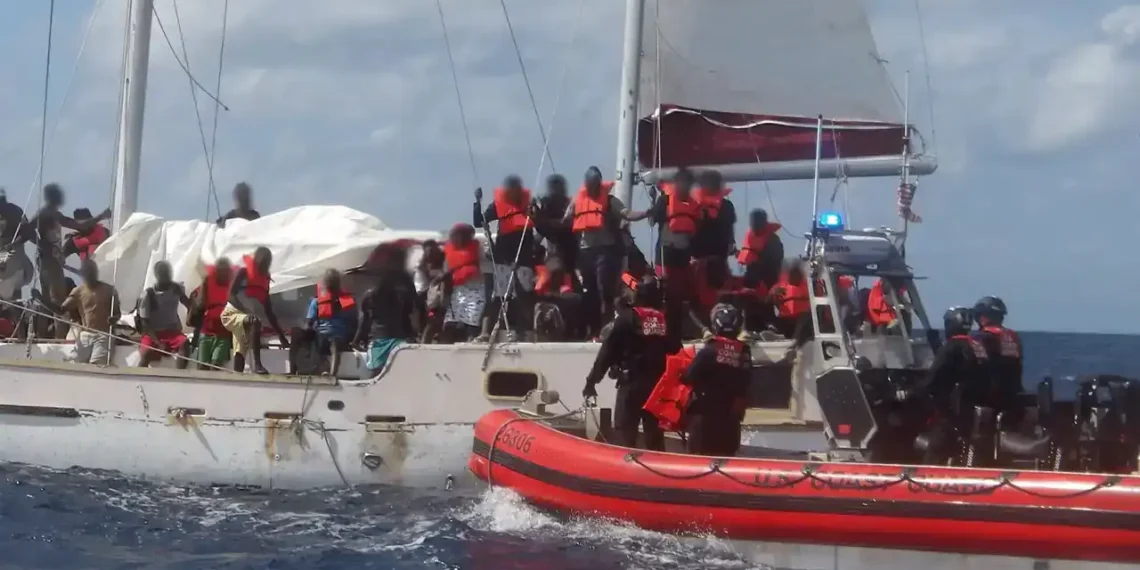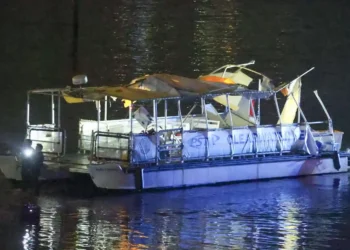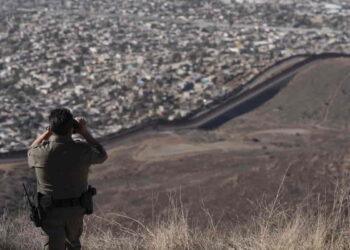U.S. faces rising maritime migration as Coast Guard responds to surge in illegal sea entries
July 28, 2025, 18:00 EDT
An increase in maritime migration attempts is posing new risks for U.S. law enforcement, as migrants from the Caribbean and beyond attempt to reach American shores by boat. Border security experts say the trend, which has accelerated in recent years, is being driven by political instability, organized smuggling, and overcrowded vessels.
Caribbean turmoil fuels maritime migration surge
According to the Migration Policy Institute, deteriorating conditions in countries like Haiti and Cuba have led to a significant increase in maritime migration toward the United States. This trend gained momentum during the Biden administration, with the U.S. Coast Guard and other agencies seeing a growing number of interceptions at sea.
In February 2023, the U.S. Naval Institute described the situation as a “state of emergency” due to the overwhelming number of interdiction operations prompted by instability across the Caribbean.
“The influx is unlike what we’ve seen in previous years,” said a Coast Guard spokesperson, emphasizing the strain it has placed on maritime enforcement resources.
Smuggling tactics vary: Fast boats vs. leaky vessels
Simon Hankinson, a senior research fellow at The Heritage Foundation’s Border Security and Immigration Center, explained that the dangers of maritime migration vary depending on how it is carried out.
“There’s a difference between professional smugglers using high-speed boats and desperate groups in makeshift vessels,” Hankinson told Fox News Digital. “The Coast Guard faces different safety and security challenges depending on who is coming and how.”
According to Hankinson, overcrowded and poorly equipped boats increase the risk of mass drownings, while more organized smuggling rings raise concerns about trafficking, drug smuggling, and the potential presence of armed individuals.
“The Coast Guard wants to prevent tragedies at sea, but they also have to think about national security,” he said.
Recent interdictions off U.S. shores
The U.S. Coast Guard and Customs and Border Protection (CBP) have made several high-profile interceptions in recent months, demonstrating the scope of the problem across various coastal states.
- San Diego, California (July 12, 2025): Three individuals attempting to enter the U.S. by boat were interdicted near Imperial Beach. Two were identified as Mexican nationals, and the third was Turkish.
- San Diego, California (January 2025): A vessel carrying 21 migrants was intercepted en route to the California coast. Initial interviews suggested most were Mexican, but follow-up checks revealed that two were actually from Guatemala and El Salvador.
- Florida Keys (February 2025): A 30-foot vessel carrying 132 Haitian migrants was stopped south of the Florida Keys. All individuals were processed and later repatriated, the Coast Guard confirmed.
Coast Guard stresses mission to protect maritime borders
Lt. Zane Carter, an enforcement officer with the Coast Guard’s Seventh District, emphasized the ongoing efforts to combat illegal maritime entry.
“Our mission is to safeguard America by securing our maritime borders,” Carter said in a statement. “We will continue prioritizing border integrity and disrupting unauthorized attempts to enter the U.S. by sea.”
The Coast Guard has stepped up patrols and surveillance along key coastal areas, particularly near Florida and Southern California, where many of these interdictions occur.
Comparing U.S. and U.K. migration trends
Hankinson warned that the U.S. may be on a similar trajectory to the United Kingdom, which is also experiencing a surge in illegal migration by sea. According to Sky News, nearly 20,000 people crossed the English Channel in the first six months of 2025—an almost 50% increase from the same period in 2024.
“You look at the U.K., and it’s a case study in what not to do,” Hankinson said. “There are stories of people being admitted under incorrect humanitarian categories, and the system can quickly become overwhelmed.”
He noted that while the U.S. system has stronger maritime enforcement capabilities, similar risks apply if proper border management is not maintained.
A complex humanitarian and security challenge
While many migrants are fleeing dire economic or political conditions, U.S. officials say they must strike a balance between compassion and national security.
“Our role isn’t just about stopping boats; it’s also about saving lives,” said a CBP official familiar with maritime operations. “But we must also protect the integrity of our immigration system and ensure that smuggling networks are disrupted.”
Experts argue that increased coordination between U.S. agencies, continued investment in surveillance technology, and cooperation with regional partners are all necessary to manage the growing pressures of maritime migration.
Conclusion: Ongoing vigilance required at sea
The rise in illegal maritime crossings presents a dynamic and evolving challenge for U.S. border enforcement. As migration pressures continue to mount from regions like the Caribbean, officials stress the importance of maintaining robust, well-resourced coastal operations.
Whether through interdictions, repatriations, or intelligence-sharing, the U.S. government is working to address the complex security and humanitarian dimensions of maritime migration.
This article was rewritten by JournosNews.com based on verified reporting from trusted sources. The content has been independently reviewed, fact-checked, and edited for accuracy, neutrality, tone, and global readability in accordance with Google News and AdSense standards.
All opinions, quotes, or statements from contributors, experts, or sourced organizations do not necessarily reflect the views of JournosNews.com. JournosNews.com maintains full editorial independence from any external funders, sponsors, or organizations.
Stay informed with JournosNews.com — your trusted source for verified global reporting and in-depth analysis. Follow us on Google News, BlueSky, and X for real-time updates.









